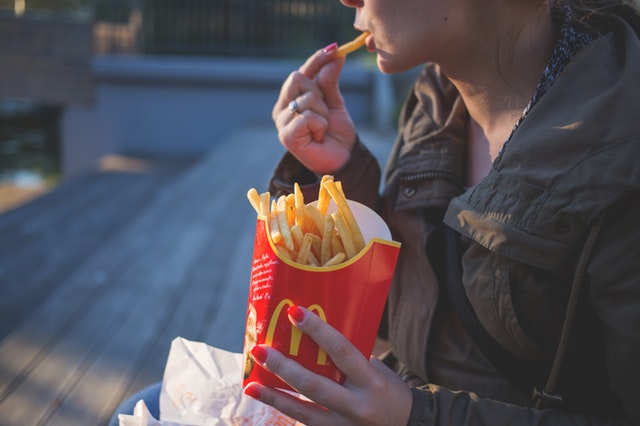Emotional eating was a big part of my own story. Stress, anxiety, boredom, frustration, tiredness, loneliness, anger and depression. Sometimes even celebration and happiness. Heck, I ate for almost all emotions.
I remember a pivotal point in my emotional eating recovery. I was finally at a place where I was mostly stable with food. Eating balanced meals. Not having tons of cravings. My weight was stable. Yet, every weekday afternoon I found myself in the kitchen, circling around looking for a snack when I wasn’t even hungry. I’d give in a little bit and reach for a bite of this or a crumb of that. It felt like a battle. I couldn’t walk away because food was “talking” to me—loudly! And, I couldn’t give in and just binge because I knew it was not biological hunger.
I made a commitment to myself and my therapist. Whenever the afternoon “picking” started, I would sit down on the couch, feel my feelings, and journal about what was going on.
Here’s what happened:
First, I learned how to sit with a feeling until it melted away.
As I practiced sitting on the couch (sounds funny that I would need to practice this–but it’s true), I discovered that if I just felt my feelings they could lessen on their own. Instead of trying to do anything about my feelings, I just felt them. As uncomfortable as it was in the beginning, it became my absolute favorite way of coping with any emotion.
You see, when you put your attention on a feeling, how it feels within your body, it has a chance to dissipate. Your mind wants to wander to why you feel this way, all the reasons and excuses. Listening to your mind can perpetuate a feeling forever! Gently reminding yourself to come back into your present moment awareness of the feeling gives the feeling the attention it needs to float away or lessen.
I found that if I put my attention on my feelings in this way, the intensity of the emotion often lifted in just a few minutes. This was so relieving for me! I had never felt in control of my own emotional experience before. It was a revelation!
Second, I discovered what was really going on with me.
Through journal writing, I found out that I was stressed at work. I worked from home and hated my job at the time. I didn’t want to be in that career, and I felt frustrated, stuck, and afraid to take new action. Since my kitchen was three steps away from my desk; and since by afternoon I was pent up frustration at my job, and since I had not addressed this issue squarely within myself, I turned to the only comfort I knew–food.
Journal writing was so valuable because I finally got to address what was going on for me. A situation that I found intolerable. Could I make immediate changes and quit my job? No. But, putting my finger on the problem certainly helped. From there I could make a plan to leave the job, talk with my husband at the time about options, and begin exploring what I really wanted to do. All of which felt empowering.
Third, I learned that food gave me a “payoff.”
Emotional eating gives us a “payoff,” a reward so to speak. We wouldn’t do it unless it was rewarding in some way. In this case, I was getting to avoid the real issue of hating my job, which scared me. I was focused on food, a distraction, that kept me from having to look at the issue that caused me fear. Instead of addressing the issue head on by taking action steps, getting a plan together, and having the tough conversations with my family and boss, I took the easy way out–obsessing about food and eating emotionally.
Sometimes the payoff is procrastination, or numbing a painful emotion, or feeling excited. At times I have reached to food for that feeling of “letting my hair down” after a long day of work or a hard week of restricting/dieting. Other times I have eaten “at” someone I was mad at, choosing food over tough conversations. And, I’ve sought excess food to fuel me when I’m tired, even when I know that doesn’t work.
Fourth, I gave myself what I truly needed.
Once you’ve identified the payoff for emotional eating, then it’s easier to see what you need to do for yourself instead of food. If you are eating out of anger, it might be time to have that tough conversation or seek therapy to help you do so. If you’re eating because you’re tired, you need to learn how to live through the day being uncomfortably tired or give yourself a nap. If you need that feeling of “letting your hair down” after a long week at work, find ways to get that feeling without food (think: a night out with girlfriends or fuzzy pajamas and a chick flick).
It could take some practice. These new habits won’t necessarily come easily. But, you can find more supportive, self-loving ways to cope with your emotions without going to food. The first step is finding the payoff!


